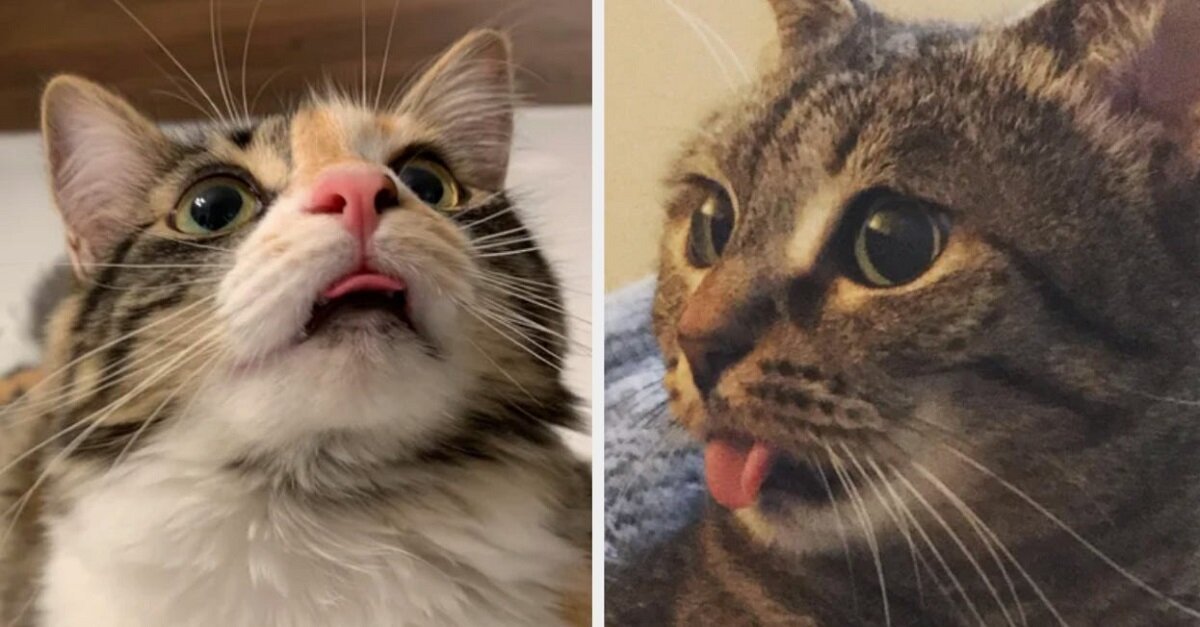Do you know why cats push things off shelves or tables?

They turn over, drop, throw and discard: why do they do this?
There’s endless talk about cats—they, like dogs, are man’s best friend. But why do they throw things on the floor, knock everything off tables, cabinets, and shelves? And all these whiskered cats do it from puppyhood—some with intense concentration and self-forgetfulness, many with mischievous glances at their owners: “How do you like that, my dear?” And breaking them of their habit of breaking and ruining our things can be very difficult. As experienced cat experts and advanced cat breeders have discovered, six breeds are particularly prone to this behavior.
Today, we offer a detailed analysis of “flights”—the way objects fly from surfaces to the floor under the influence of a clawed paw and a cheeky snout. It turns out it’s all simple, and this behavior, like the animal itself, is worthy of respect and attention. Let’s explore the issue.
Because they are bored…
The main reason cats are prone to disruption is because they’re bored and looking for entertainment. They’re intelligent animals who need mental and physical stimulation to thrive. When they don’t get it, they find ways to please themselves. This can include your pet knocking things over, dropping them, and throwing them on the floor!
Hunting instinct
Cats are natural hunters. In the wild, they climb, jump, stalk and fight off enemies, and catch prey. Although your kitten may seem like a true homebody, they still retain their natural hunting instincts: when something in the house reminds them of prey, they instantly focus their attention on it. They satisfy their natural hunting instinct by “fighting” objects and knocking them over!
Curiosity
Your furry friend may knock things over simply because they’re trying to see what the object or thing will do after contact. These little creatures are naturally curious and want to “interact” when they see something that piques their interest. While your meowing friend may not intend to knock something over, they might do so accidentally.
Cats rely heavily on their senses to understand the world around them. They particularly enjoy touching objects with their paws, exploring them; part of this exploration process often involves knocking things over or pushing them off shelves onto the floor. Furthermore, this activity provides sensory stimulation. The sound of falling objects, their movement, and the tactile feedback of striking them can all help them practice perceiving the world around them.
Attention-seeking behavior
Many people think of cats as strange, independent animals. They’re often not particularly affectionate or loyal to their owners. But this isn’t entirely true. Another reason cats like to knock things off tables is to get their attention. They do this in a variety of ways: by pushing various objects around the house or simply jumping around them. Your pet may also behave this way to show you they’re hungry or simply to let you know it’s time to play.
Is it normal for cats to turn everything upside down?
Yes, it’s perfectly normal for cats to behave this way. Curiosity, attention-seeking, and innate hunting instincts are often the reasons for this behavior. In most cases, your pet isn’t trying to act like a mindless brat; they’re simply having fun and following their instincts.
Also keep in mind that they may accidentally knock over objects while playing. Or they may get overly excited or caught up in chasing a toy and accidentally knock over everything in their path. In this case, they need to be understanding and forgiving.
Sometimes, whiskered cats will deliberately knock over objects to get your attention or express their displeasure. Yes, our little bears can behave aggressively when they feel ignored. In most cases, this behavior is considered normal, but sometimes it can indicate a more serious psychological issue. If your pet frequently drops objects or shows signs of discomfort or anxiety, you may need to pay closer attention to their behavior.
Although it’s commonly believed that cats can live and roam on their own, they actually become very attached to people and adapt so well to being around them that, left alone for long periods, they become extremely stressed, often resulting in behavioral problems. For example, they may chew everything in the house, tear wallpaper, and knock over flower pots. Some furry creatures may even attack antennas, electrical cords, and appliance cords. They often do this during periods of extreme stress, when left alone. In these cases, owners are advised to consult with specialists who can help change their pet’s behavior.
What objects attract a cat’s attention the most?
Yes, they are particularly attracted to certain objects, such as small objects and things that resemble prey. They may also enjoy playing with things that move or make noise.
Similarly, a pet’s attention may be drawn to objects with an interesting texture, surface, or scent, such as corrugated paper or fragrant plants. They may also enjoy throwing things down from a certain height, such as high shelves or a cabinet. Each cat has its own preferences, especially if there’s more than one cat in the house. Many bullies enjoy bags and boxes, which they’re also happy to throw on the floor. Not for the sake of exploration or curiosity, but rather to climb inside and escape the complex world.
6 Cat Breeds That Are Particularly Prone to Dropping and Knocking Things Over
Cornish Rex
duodenum82
Cornish Rex cats are known for their mischievous and playful nature. They love to explore their surroundings and may accidentally knock over objects in the process. This breed gets along well with their owners, but when left alone, their lively nature can lead to mischief.
Bombay cat
freepik
Bombay cats are inquisitive and enjoy exploring their surroundings. This trait may prompt them to test objects by hitting them or turning them over to see how they react. With an innate climbing instinct, they enjoy exploring vertical spaces.
Sphinx
Alina Vilchenko
Despite their “naked” appearance, Sphynxes are full of energy. They can use their agility to hit objects and knock them over during play. Their intelligence drives them to seek out stimulation around them, and when left without entertainment, they can exhibit strange behavior, such as knocking things over, even when you’re nearby.
Munchkin
freepik
Despite their small stature and short legs, Munchkins love to knock over anything in their path. These cats are energetic and often playfully throw objects from heights. This is often due to their innate instincts. Like many breeds, Munchkins enjoy interacting with people. If they feel neglected or bored, they resort to attention-seeking behaviors, such as throwing things off the table and waiting for their owners to react.
Snowshoe
salsa_snowshoe
Cats are very intelligent and curious little animals. It’s therefore not surprising that they will paw at objects in an attempt to understand what’s going on around them. This breed is also playful and will participate in any activity that involves paw-swiping.
Bengal cat
Bengals are energetic and adventurous animals with a strong innate hunting instinct. They may knock over or knock over objects, mimicking hunting behavior or seeking stimulation. When bored, they may express their frustration by rummaging through cabinets, playing with the toilet, crumpling tissues, and hiding things.
You should discourage your cat from dropping objects when its behavior becomes annoying, destructive, or potentially harmful. If your pet consistently exhibits this behavior, causing stress for you or your family, it’s a sure sign that you need to address the issue.
If your pet’s behavior results in damage to expensive items, furniture, or valuable household items, it’s time to intervene. Broken objects can cause injury and negatively impact both you and your pet. This behavior can also indicate health issues, such as vision impairment, inner ear infections, and neurological disorders. Pet parents need to understand why their cats are behaving this way and whether it’s harmful.
How to stop a cat from throwing things?
While your cat may enjoy throwing things, this behavior can become destructive . Here are some tips on how to change your cat’s behavior.
Determine the cause
To stop your cat from dropping things, you need to determine why they do it. Notice patterns, such as where and when they do it. Also, pay attention to how you respond to this behavior. Whether it’s driven by curiosity, playfulness, attention seeking, etc., identifying the cause can help you develop solutions.
Protect your home from pet mischief
If you notice your cat is prone to knocking things over and knocking them over without provocation, it’s time to cat-proof your home. This could mean storing breakable items out of reach or laying crumpled aluminum foil on surfaces to prevent your cat from jumping on them. Another option is adhesive tape or a special gel for securing objects to surfaces.
Determine where you store things
Be mindful of where you place items in your home. Avoid placing them near the edges of tables or shelves, where they could be knocked over. Keeping countertops and tables clean can also discourage your cat from knocking things over. Also, regularly clear countertops of anything that might attract your pet, such as food, dishes, or fragile objects.
Ignore the pet
If your cat throws things on the floor because it irritates you, they’ll likely continue doing it. Your reaction reinforces their behavior because they’re getting what they want—your attention. To stop this, simply ignore the behavior.
Play with your cat
Cats often drop objects when they’re bored. To prevent this, spend more time playing with your pet. You can also buy toys that stimulate their physical and mental activity. Find different ways to entertain your cat and prevent boredom. Try to avoid using impossible-to-catch objects in play. They’re more interested in the outcome than the process itself. So, a laser pointer isn’t an option. Cats need something to catch.
Offer her stimulating activities
Offer her a variety of activities that will entertain and enrich her. These could include scratching posts, special cat trees, various climbing frames and shelves, or interactive mouse toys that mimic movement.
Redirecting their attention
If you catch your cat throwing things on the floor, redirect their attention to more appropriate activities. Offer them a toy or engage them in play to distract them from destructive behavior and reinforce positive interactions. Consistent redirection and rewards can help cats learn to adjust their natural instincts and behavior accordingly.
We accustom the cat to loneliness
Desensitization can help here . This is a gradual but short-term exposure of the cat to a stressor. For example, if your pet panics when left alone, try leaving the animal alone for short periods of time. Start with a few minutes, gradually increasing the time. For example, leave the apartment to take out the trash.
Counterconditioning can also help . Your goal is to transform your pet’s negative experiences with stress into positive ones. For example, when you’re training your cat to be left alone for short periods of time, give her a treat before leaving. Upon your return, give her her favorite treat again.
If your pet has a favorite toy, hide it before leaving the house . Just before you leave, take it out and give it to your furry friend. Upon returning, give them a treat and take the toy back, hiding it again.
Source of the article: Why Do Cats Push Things Off Tables?














